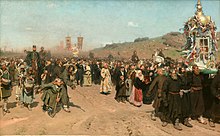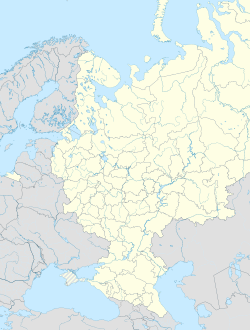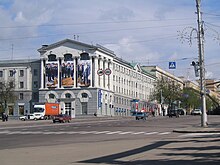Kursk
| city
Kursk
Курск
|
||||||||||||||||||||||||||||||||||||||||||
|
||||||||||||||||||||||||||||||||||||||||||
|
||||||||||||||||||||||||||||||||||||||||||
| List of cities in Russia | ||||||||||||||||||||||||||||||||||||||||||

Kursk ( Russian Курск ) is a city in the European part of Russia .
geography
Kursk is the capital of the Kursk Oblast and is located around 500 km south of Moscow not far from the border with Ukraine . The city, through which the Seim flows, has 415,159 inhabitants (as of October 14, 2010).
West of the city is a meteorite crater with a diameter of 5.5 kilometers, see Kursk crater .
City structure
|
climate
| Kursk | ||||||||||||||||||||||||||||||||||||||||||||||||
|---|---|---|---|---|---|---|---|---|---|---|---|---|---|---|---|---|---|---|---|---|---|---|---|---|---|---|---|---|---|---|---|---|---|---|---|---|---|---|---|---|---|---|---|---|---|---|---|---|
| Climate diagram | ||||||||||||||||||||||||||||||||||||||||||||||||
| ||||||||||||||||||||||||||||||||||||||||||||||||
|
Average monthly temperatures and precipitation for Kursk
Source: Roshydromet
|
|||||||||||||||||||||||||||||||||||||||||||||||||||||||||||||||||||||||||||||||||||||||||||||||||||||||||
history
Affiliation
Kursk was founded around 980 as a fortress of the Kievan Rus and was first mentioned in a document in 1032, but excavations indicate a settlement at least since the 5th century BC. The city was a fortified trading center. In 1237 it was completely destroyed by the forces of the Golden Horde under the leadership of Batu Khan . After that the city was fought over by several small principalities. In 1285 it was again devastated and burned down by the Mongols under Nogai Khan . Kursk was temporarily occupied by the Grand Duchy of Lithuania in the 14th century and only recaptured by the Grand Duchy of Moscow in 1508 . Kursk was expanded into a fortress and was exposed to attacks by the Poles (1611/12) and Crimean Tatars until the 18th century .
In 1708 Kursk was added to the Kiev governorate . In 1727 Kursk was accepted into the newly formed Belgorod governorate . In 1779 Kursk received city status. In 1797 the new Kursk governorate was created. In the 1860s, Kursk became a hub in the newly created railway network, which led to a surge in industrialization. After the dissolution of the Kursk Governorate in 1928, the city initially belonged to the Central Black Earth Oblast . In 1934 the Kursk Oblast , which still exists today, was formed.
Second World War
During the Second World War , Kursk was occupied by the Wehrmacht from November 4, 1941 to February 8, 1943 . Around 3,000 residents were shot during the occupation and around 10,000 were deported to the German Reich as forced laborers . Well known is the Battle of Kursk (also known as the Battle of the Kursk Arch ) in July and August 1943, the largest tank battle in the history of warfare.
In Besse Dino, 18 km east of Kursk direction Voronezh , the German military cemetery Kursk-Besse Dino is (also Besedino, 51 ° 42 ' N , 36 ° 31' O ) as a collecting cemetery for about 26,070 war dead (2009) provided at the 17th Inaugurated October 2009. After the reburial is over, around 40,000 war victims are said to be buried here.
In Kursk there was a POW camp 145 for German prisoners of war of the Second World War.
reconstruction
After the war the city was rebuilt and new industrial plants were built.
Population development
| year | Residents |
|---|---|
| 1897 | 75,721 |
| 1926 | 98,780 |
| 1939 | 119,977 |
| 1959 | 204.712 |
| 1970 | 284.162 |
| 1979 | 375.345 |
| 1989 | 424.239 |
| 2002 | 412,442 |
| 2010 | 415.159 |
Note: census data
Economy and Infrastructure
Today Kursk is an important administrative and industrial city. The iron processing, the chemical and the food industry are the most important branches of the economy. Agriculture is also important, as Kursk is located in the fertile black earth region.
The Kursk Magnetic Anomaly (KMA), the world's largest known iron ore basin with an average iron content of between 35 and 60%, is particularly well known .
In the Kursk Oblast of the city is close to Kurchatov the Kursk Nuclear Power Plant . Four graphite-moderated reactors of the type RBMK -1000 are operated there, these are reactors that were also used in the Chernobyl nuclear power plant . The reactors went into operation between 1977 and 1986.
Further educational institutions
- Faculty of Moscow State Commercial University
- Branch of the All-Russian Remote Institute of Finance and Economics
- Humanities and technical institute
- Kursk Department of the Orel Regional Civil Service Academy
- Kursk Branch of the Orlov Legal Institute of the Ministry of Interior of Russia
- Institute for Business, Economics and Management Kursk
- Natural and Human Sciences Institute Kursk
- State Agricultural Academy Kursk
- Kursk State Medical University
- Kursk State Technical University
- Kursk State University
traffic
Kursk is connected to the Russian capital Moscow via the M2 Krym highway . At the same time, the city is the starting point of the junction R298 , which leads east via Voronezh to Borisoglebsk .
Sports
In football, the city is represented by the club Awangard Kursk . The city was one of the venues for the 1965 World Bandy Championships .
sons and daughters of the town
- Reinhold von Anrep-Elmpt (1834–1888), German-Baltic officer in Imperial Russian service and explorer
- Ljuba Arnautovic (* 1954), Austrian translator, journalist, author and writer
- Ekaterina Avdejewa (1788–1865), writer
- Oleh Babajew (1965–2014), Ukrainian politician
- Boris Babkin (1877–1950), physiologist
- Dmitri Badin (* 1990), hacker
- Apollinari Bondarzew (1877–1968), botanist
- Andrei Borowych (1921–1989), fighter pilot
- Alexander Deineka (1899–1969), painter, graphic artist and sculptor
- Nikolai Fedorowski (1886–1956), mineralogist
- Pavlo Klimkin (* 1967), Ukrainian diplomat and politician, Foreign Minister of Ukraine from 2014 to 2019
- Nikolai Korotkow (1874–1920), doctor and surgeon
- Nikolaj Obuchow (1892–1954), composer
- Georgi Orlow (1901–1985), architect and university professor
- Pavel Pevzner (* 1956), Russian-American bioinformatician
- Alexander Powetkin (* 1979), heavyweight boxer
- Sergei Puskepalis (born 1966), actor
- Alexander Ruzkoi (* 1947), officer, politician, governor of Kursk Oblast from 1996 to 2000
- Irina Samochina (* 1971), publisher
- Seraphim von Sarow (1759–1833), monk and mystic
- Nikolai Schiljajew (1881–1938), composer and music teacher
- Juri Stjopkin (* 1971), judoka
- The Tolmacheva Sisters (* 1997), singers, first in the Junior Eurovision Song Contest 2006 , participant in the Eurovision Song Contest 2014
- Konstantin Trutowski (1826–1893), painter, draftsman and illustrator
- Valery Tschaplygin (* 1952), cyclist and Olympic champion in 1976
- Wassili Tupikow (1901–1941), Lieutenant General
Town twinning
Kursk lists the following twin cities :
-
 Dębno ( Poland )
Dębno ( Poland ) -
 Tczew ( Poland )
Tczew ( Poland ) -
 Witten ( Germany , North Rhine-Westphalia )
Witten ( Germany , North Rhine-Westphalia ) -
 Speyer (Germany, Rhineland-Palatinate )
Speyer (Germany, Rhineland-Palatinate ) -
 Gomel ( Belarus ) since 2004
Gomel ( Belarus ) since 2004 -
 Navapolatsk ( Belarus ) since 2014
Navapolatsk ( Belarus ) since 2014 -
 Niš ( Serbia )
Niš ( Serbia ) -
 Užice ( Serbia ) since 1967
Užice ( Serbia ) since 1967 -
 Sumy ( Ukraine ) since 2007
Sumy ( Ukraine ) since 2007
Individual evidence
- ↑ a b c Itogi Vserossijskoj perepisi naselenija 2010 goda. Tom 1. Čislennostʹ i razmeščenie naselenija (Results of the All-Russian Census 2010. Volume 1. Number and distribution of the population). Tables 5 , pp. 12-209; 11 , pp. 312–979 (download from the website of the Federal Service for State Statistics of the Russian Federation)
- ↑ description war cemetery Kursk Besedino
- ↑ Letter from the Volksbund Deutsche Kriegsgräberfürsorge e. V. to its members and donors from March 24, 2010
- ↑ Memorial (PDF; 662 kB)
- ↑ Peaceful encounter in Kursk, page 11
- ↑ Maschke, Erich (ed.): On the history of the German prisoners of war of the Second World War. Verlag Ernst and Werner Gieseking, Bielefeld 1962–1977.





